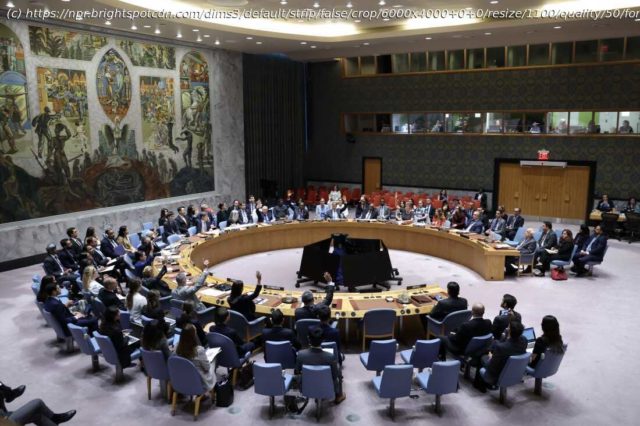As accusations of genocide in Gaza mount against Israel, NPR looks at how the term is defined legally and why previously reticent scholars have changed their minds.
As world leaders gather in New York this week for the U.N. General Assembly, a growing number of experts are calling on diplomats to address what they describe as genocide and famine in Gaza.
Israel strongly rejects accusations that it is guilty of genocide in its nearly two-year campaign in Gaza following the Hamas-led Oct. 7, 2023, attack that killed nearly 1,200 people, with another 250 taken hostage, according to Israeli officials.
The Israeli military campaign that followed has killed more than 64,000 people, including more than 18,000 children, according to Gaza health authorities. Almost all of Gaza’s estimated 2 million residents have been forced to flee their homes, often multiple times. Many Palestinians, as well as rights groups and some prominent Americans, have said Israel is responsible for genocide in the enclave.
In the United States, the word has started to enter the public discourse. Polls show Democrats and independents are increasingly likely to describe Israel’s actions as genocide, even as Republican views have remained steady.
To understand what the term means and how it has become such a battleground, NPR spoke with historians, legal scholars, military analysts and people living through the war. The scholars say it’s difficult to hold states legally responsible for any crimes. And some pointed to a thornier issue: the burden of proving that Israel’s war in Gaza is motivated by „genocidal intent.“What does genocide mean?
The term „genocide“ was introduced in 1944 by Polish Jewish lawyer Raphael Lemkin to describe the extermination of European Jews during the Holocaust. Lemkin’s early exposure to the history of Ottoman attacks on Armenians and the pogroms in Poland was instrumental in shaping his belief that groups needed protection under international law.
In 1948, four years later, the United Nations adopted the Convention on the Prevention and Punishment of the Crime of Genocide, often called the Genocide Convention, defining genocide as „any of the following acts committed with intent to destroy, in whole or in part, a national, ethnical, racial or religious group, as such:
(a) Killing members of the group;
(b) Causing serious bodily or mental harm to members of the group;
(c) Deliberately inflicting on the group conditions of life calculated to bring about its physical destruction in whole or in part;
(d) Imposing measures intended to prevent births within the group;
(e) Forcibly transferring children of the group to another group.“
Both Israel and the U.S. have ratified the convention — Israel in 1950 and the U.S. in 1988.How are countries tried for genocide in courts?
The International Court of Justice (ICJ) in The Hague, Netherlands, handles disputes between countries, including under the Genocide Convention. A separate court, the International Criminal Court, entered into force in 2002 to prosecute individuals for genocide, war crimes and crimes against humanity. But it has no jurisdiction over countries that haven’t joined, among them the U.S., Israel, Myanmar and China. Outside the courts, the U.N. Security Council can authorize the protection of civilians, but that power is often paralyzed by the veto powers of the council’s five permanent members.
In Rwanda, the International Criminal Tribunal for Rwanda ruled that the 1994 mass killings of the Tutsi minority constituted genocide, and it convicted several political and military leaders for organizing and inciting it. In the war following the breakup of the former Yugoslavia, the ICJ found that genocide occurred in 1995 in Srebrenica, where around 8,000 Bosnian Muslims were killed by a Serbian-aligned force. But the court did not hold Serbia directly responsible for committing genocide, only for failing to prevent it.
The U.S. has also formally recognized genocides against Armenians and Darfuris. Then-President Barack Obama labeled ISIS’s actions genocide, and President Trump used the term to describe the situation facing white South Africans.
Gambia brought a still-ongoing case against Myanmar to the ICJ in 2019, accusing it of genocide over a military campaign that forced more than 700,000 Rohingya to flee. The U.K. and other states argued in that case that intent could be inferred from the mass displacement and harm to children. Myanmar claims it was targeting terrorists, but the court rejected its bid to throw out the case and is now weighing it on the merits.Why is „intent“ in genocide cases hard to prove?
Genocide is considered the hardest crime to prove in court.
The „intent“ requirement makes it distinct, said Shannon Fyfe, a legal scholar at Washington and Lee University.
„Proving intent tends to be the most difficult part of any criminal case“, she said. „The ICJ says genocidal intent must be the only reasonable inference from the available evidence.“
The Genocide Convention’s drafters added „as such“ to require that acts be carried out because of who the group is, not just to achieve another goal — something judges struggle to assess.Gaza: Early warnings, early rejections
Just days after Israel began its bombing campaign in Gaza, Raz Segal, an Israeli-American scholar of Jewish history and Holocaust and genocide studies, wrote that it represented a „textbook case of genocide.“
In particular, Segal pointed to what he viewed as a deliberate intent to destroy, citing then-Defense Minister Yoav Gallant’s order to impose a siege on the enclave.
Shortly after he publicly accused Israel of genocide in Gaza, the University of Minnesota rescinded its offer for him to lead the school’s Center for Holocaust and Genocide Studies.
„People ask me, ‚Wasn’t it too soon on Oct. 13?‘ No. The convention is activated by the risk of genocide, not just its occurrence. That’s the whole point of prevention. That’s the meaning of ‚Never Again'“, Segal told NPR, referencing a common saying calling for the Holocaust to never be repeated.
He added that denying Israel was committing any war crimes, including genocide, allowed for Israel’s actions to be justified.
„As if the Hamas-led massacres that day were not terrible enough, Israel and its allies, primarily the United States, including President Biden, immediately started circulating this atrocity propaganda“, he said. „The lies and fabrications — like the false claim about beheaded babies — continuously shifted the focus not to Israeli violence but to the alleged barbarity of the Palestinians, to the point where they were seen as a danger that no international law should apply to.“When did a Palestinian „genocide“ become a legal claim? A timeline
In November 2023, the Biden administration was named in a federal lawsuit filed by the Center for Constitutional Rights and the law firm Van Der Hout LLP on behalf of Palestinian individuals and the human rights organizations Al-Haq and Defense for Children International-Palestine, along with eight other plaintiffs.
The suit alleged that the „unfolding genocide of the Palestinian people in Gaza has so far been made possible because of the unconditional support“ of President Joe Biden, Secretary of State Antony Blinken and Defense Secretary Lloyd Austin.
Laila Elhaddad, a Palestinian American author from Gaza and one of the plaintiffs, went to court on Jan. 26, 2024, and later told NPR that she knew it was a long shot, but she felt „uniquely obligated, as an American whose taxes were partly financing the killing of my family members“, to take legal action.
She added, „We as Palestinians understood from the start the intent to genocide.






